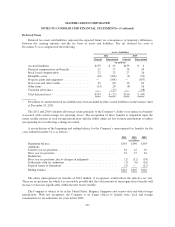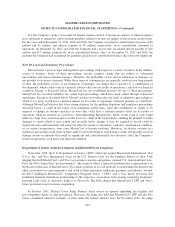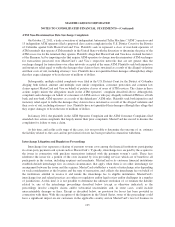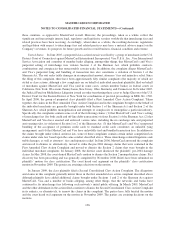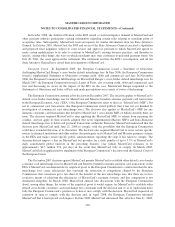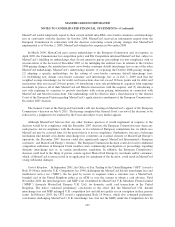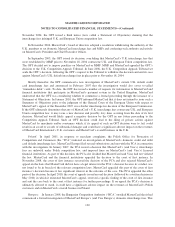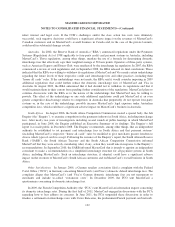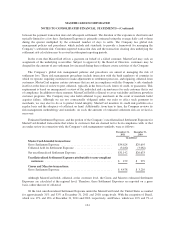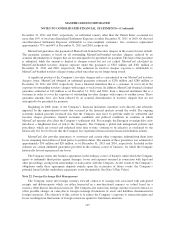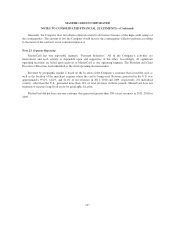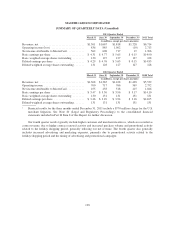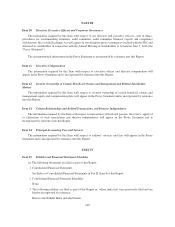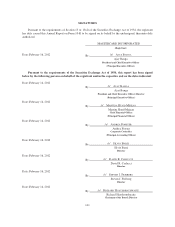MasterCard 2011 Annual Report Download - page 135
Download and view the complete annual report
Please find page 135 of the 2011 MasterCard annual report below. You can navigate through the pages in the report by either clicking on the pages listed below, or by using the keyword search tool below to find specific information within the annual report.MASTERCARD INCORPORATED
NOTES TO CONSOLIDATED FINANCIAL STATEMENTS—(Continued)
followed an informal investigation that the HCA had been conducting since the middle of 2007. In July 2009, the
HCA issued to MasterCard a Preliminary Position that MasterCard Europe’s historic domestic interchange fees
violate Hungarian competition law. MasterCard responded to the Preliminary Position both in writing and at a
hearing which was held in September 2009. Subsequently in September 2009, the HCA ruled that MasterCard’s
(and Visa’s) historic interchange fees violated the law and fined each of MasterCard Europe and Visa Europe
approximately $3 million, which was paid during the fourth quarter of 2009. In December 2009, the HCA issued
its formal decision and MasterCard appealed the decision to the Hungarian courts. In September 2010, the HCA
filed its reply to MasterCard’s appeal, while MasterCard filed its response in October 2010. In October 2010, the
Hungarian appeals court stayed the proceeding until MasterCard’s appeal to the General Court of the European
Union of the European Commission’s December 2007 cross-border interchange fee decision is finally decided. If
the HCA’s decision is not reversed on appeal, it could have a significant adverse impact on the revenues of
MasterCard’s Hungarian customers and on MasterCard’s overall business in Hungary.
Italy. In July 2009, the Italian Competition Authority (“ICA”) commenced a proceeding against
MasterCard and a number of its customers concerning MasterCard Europe’s domestic interchange fees in Italy.
MasterCard, as well as each of the banks involved in the proceeding, offered to give certain undertakings to the
ICA, which were rejected (which rejection MasterCard appealed to the Administrative Court). In May 2010, the
ICA issued a Statement of Objections to MasterCard and the banks. In November 2010, the ICA adopted a
decision in which it determined that MasterCard Europe’s domestic interchange fees violate European Union
competition law, fined MasterCard 2.7 million euro (approximately $4 million) and ordered MasterCard to
refrain in the future from maintaining interchange fees that are not based on economic justifications linked to
efficiency criteria and to eliminate any anticompetitive clauses from its licensing agreements. MasterCard
appealed the ICA’s infringement decision to the Administrative Court. Subsequently, in November 2010, the
Administrative Court announced its judgment that the ICA had improperly rejected MasterCard’s proposed
undertakings and annulled the ICA’s undertakings decision (which judgment the ICA appealed to the Council of
State). In May 2011, the General Court overturned the Administrative Court’s undertakings judgment on
procedural grounds and MasterCard refiled its undertakings appeal as part of its appeal of the ICA infringement
decision. In July 2011, the Administrative Court again issued a judgment that the ICA had improperly rejected
MasterCard’s proposed undertakings and annulled for a second time the ICA’s undertakings decision and, on that
basis, also annulled the ICA’s infringement decision. The ICA has appealed the Administrative Court’s most
recent judgment to the Council of State. If the Administrative Court’s second judgment is overturned, it is likely
that the Administrative Court would reconsider MasterCard’s appeal of the ICA’s infringement decision. If the
ICA’s infringement decision is not reversed on appeal, the ICA’s decision could have a significant adverse
impact on the revenues of MasterCard’s Italian customers and on MasterCard’s overall business in Italy.
Canada. In December 2010, the Canadian Competition Bureau (the “CCB”) filed an application with the
Canadian Competition Tribunal to strike down certain MasterCard rules related to interchange fees, including the
“honor all cards” and “no surcharge” rules. Also in December 2010, MasterCard learned that a purported class
action lawsuit had been commenced against it in Quebec on behalf of Canadian merchants and consumers. That
suit essentially repeats the allegations and arguments of the CCB application to the Canadian Competition
Tribunal and seeks compensatory and punitive damages in unspecified amounts, as well as injunctive relief. In
March 2011, a second purported class action lawsuit was commenced in British Columbia against MasterCard,
Visa and a number of large Canadian banks, and in May 2011 a third purported class action lawsuit was
commenced in Ontario against the same defendants. These suits allege that MasterCard, Visa and the banks have
engaged in a price fixing conspiracy to increase or maintain the fees paid by merchants on credit card
transactions and that MasterCard’s and Visa’s rules force merchants to accept all MasterCard and Visa credit
cards and prevent merchants from charging more for payments with MasterCard and Visa premium cards. The
second suit seeks compensatory damages in unspecified amounts, and the third suit seeks compensatory damages
of $5 billion. The second and third suits also seek punitive damages in unspecified amounts, as well as injunctive
131


